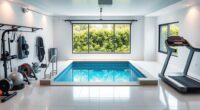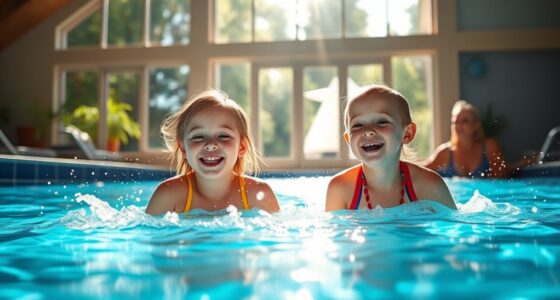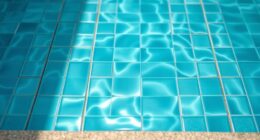Choosing between an indoor or outdoor endless pool depends on your climate, space, and privacy needs. Indoor pools offer year-round use, better customization, and less maintenance from weather, but they require a bigger initial investment. Outdoor pools are more budget-friendly upfront and great for enjoying sunsets, but they need more upkeep and are seasonal in colder climates. To find the best fit for your lifestyle and property, explore all the factors involved below.
Key Takeaways
- Indoor pools offer year-round use and enhanced privacy, while outdoor pools are more affected by weather and seasonal limitations.
- Outdoor pools generally have lower initial costs but higher ongoing maintenance due to exposure to the elements.
- Indoor pools provide better temperature control, lighting customization, and integrated design options for aesthetic harmony.
- Outdoor pools are more susceptible to debris, algae, and weather damage, increasing cleaning and repair efforts.
- The choice depends on climate, budget, privacy needs, and long-term maintenance preferences.
Space and Location Considerations

When choosing between an indoor or outdoor endless pool, space and location are critical factors to contemplate. You need enough room to accommodate the pool comfortably, along with surrounding areas for movement and maintenance. Indoor pools require a dedicated indoor space, which could mean renovating an existing room or building a new structure. This might limit your options depending on your property’s layout. Outdoor pools, on the other hand, depend on available yard space and proximity to your home. Consider how accessible the area is year-round and whether your property can support the pool’s size without crowding existing features. Proper placement guarantees convenience, safety, and minimal disruption, making space and location essential in your decision-making process.
Climate and Weather Impact

Climate and weather considerably influence whether an indoor or outdoor endless pool is more practical for your home. In regions with harsh winters, outdoor pools may face freezing temperatures, ice buildup, and snow, making them less accessible year-round. Conversely, mild or hot climates allow outdoor pools to be enjoyed daily without weather concerns. Indoor pools, however, provide a controlled environment, unaffected by seasonal changes. Consider these factors:
- Temperature fluctuations that affect water comfort
- Precipitation leading to algae or debris accumulation
- Sun exposure causing water evaporation and chemical imbalance
- Wind bringing dust and debris into outdoor pools
- Seasonal weather patterns impacting maintenance needs
- Projector technology can influence how well you see details in different lighting conditions, which is relevant when choosing between indoor and outdoor setups.
Understanding your local climate helps you choose a pool setup that minimizes upkeep and maximizes enjoyment.
Privacy and Noise Levels

Your privacy can be a major factor when choosing between indoor and outdoor pools, as indoor setups often offer more seclusion. Noise levels also vary; outdoor pools might be affected by surrounding sounds, while indoor pools can contain noise more effectively. Considering these points helps you decide which environment aligns best with your comfort and peace of mind.
Sound Privacy Benefits
Indoor Endless Pools offer significant sound privacy benefits because they are enclosed spaces that contain noise, preventing it from disturbing nearby areas. This means you can enjoy your swim without worrying about noise leaks or disturbing household members. The walls and doors act as sound barriers, reducing echoes and muffling sounds from the pool’s operation. You’ll experience a quieter environment, ideal for early morning or late-night swims. Additionally, indoor settings minimize external noise interference, creating a peaceful atmosphere. To maximize privacy, consider the following:
- Proper insulation for walls and doors
- Quiet pool equipment and pumps
- Soundproof flooring options
- Sealed windows and ventilation systems
- Strategic placement away from noisy areas. Proper soundproofing techniques can further enhance your indoor pool’s privacy and tranquility.
Noise Distraction Factors
When considering noise distraction factors for an endless pool, it’s important to recognize how both privacy and noise levels can impact your swimming experience. Outdoor pools are exposed to ambient sounds like traffic, wind, or nearby activities, which can be distracting or even disruptive. Indoor pools, on the other hand, tend to be quieter, protected from external noise, but may generate noise from equipment like pumps, filters, or ventilation systems. Privacy also plays a role—outdoor pools can be more exposed, making some users uncomfortable, while indoor pools offer more seclusion. Both settings can be optimized to reduce distractions: outdoor pools with landscaping or fencing, indoor pools with soundproofing measures. Consider your tolerance for noise and privacy needs when choosing your pool location.
Maintenance and Upkeep

Maintaining your pool requires consistent effort, whether it’s indoors or outdoors. Indoor pools can face challenges like humidity and mold, while outdoor pools need protection from debris and weather damage. You’ll also want to contemplate the ongoing costs of repairs and upkeep to keep your pool in top shape. Additionally, understanding the specific personality traits involved in managing maintenance tasks can help in developing effective routines and ensuring long-term care.
Maintenance Challenges in Indoor Pools
Despite the convenience of having an indoor pool, keeping it in ideal condition requires consistent effort and attention. Indoor pools face unique maintenance challenges that demand vigilance. High humidity levels can lead to mold, mildew, and corrosion, damaging both the structure and equipment. Poor ventilation exacerbates these issues and can cause musty odors. Additionally, indoor pools are more prone to chemical imbalances due to limited natural airflow, making water quality harder to maintain. You also need to regularly:
- Monitor humidity and ventilation systems
- Prevent mold and mildew growth
- Balance chemical levels precisely
- Inspect for corrosion on fixtures and equipment
- Manage indoor air quality effectively
Implementing proper outdoor kitchen ventilation and humidity control techniques can significantly reduce these risks. Addressing these challenges ensures your indoor pool remains safe, clean, and inviting while minimizing costly repairs.
Outdoor Pool Upkeep Concerns
Outdoor pools require regular upkeep to stay inviting and safe, especially because they’re exposed to the elements. You need to clean debris frequently, check for algae growth, and balance chemicals like chlorine to prevent bacteria. Weather conditions can cause wear and tear faster, leading to equipment corrosion or surface damage. You’ll also need to cover the pool during storms or winter to protect it. To help you stay organized, here’s a quick overview:
| Maintenance Task | Frequency |
|---|---|
| Skimming debris | Daily |
| Chemical balancing | Weekly |
| Cover installation | As needed (seasonal) |
Staying on top of these concerns keeps your outdoor pool safe, clean, and enjoyable year-round. Regular maintenance routines are essential for prolonging the lifespan of your pool equipment and surfaces.
Cost of Upkeep and Repairs
Keeping up with outdoor pool maintenance can add up quickly, especially when it comes to costs. You’ll need to budget for seasonal cleaning, chemical balancing, and addressing weather-related wear and tear. Outdoor pools are exposed to the elements, which can accelerate equipment repairs and increase chemical usage. Outdoor pools may also require protective covers or heaters, which can further raise expenses. Indoor pools, however, tend to have lower ongoing expenses but may incur costs for ventilation and humidity control. Consider these factors:
- Regular chemical testing and balancing
- Covering or heating costs
- Equipment repairs due to weather exposure
- Increased energy bills for outdoor heating
- Maintenance of surrounding landscape or deck
- Maintenance materials and routine inspections can help prevent costly repairs over time.
Ultimately, outdoor pools demand more frequent attention and higher expenses over time, while indoor pools may have steadier, predictable costs.
Cost and Budget Implications

When considering the cost and budget implications of installing an Endless Pool, location plays a crucial role in determining your overall expenses. Indoor pools often require higher upfront investments due to construction, ventilation, and climate control systems. These costs can quickly add up, especially if you’re building a dedicated room. Outdoor pools generally have lower installation costs because they don’t need climate regulation or extensive structural modifications, but you might face higher ongoing expenses for maintenance, weatherproofing, and protective covers. Keep in mind, indoor pools may save money over time by reducing maintenance due to protection from the elements. Additionally, the cultural and regional preferences for outdoor versus indoor pools can influence your choice, as some areas have a tradition of outdoor swimming that aligns with your lifestyle. Your choice should balance initial costs with long-term expenses, ensuring you select an option that fits your budget and financial comfort.
Usage and Accessibility

Indoor Endless Pools offer the convenience of year-round access regardless of weather, making them highly accessible for daily use. You can swim whenever you want, without concern about outdoor conditions or seasonal changes. This ease of access encourages consistency in your routine and simplifies scheduling. Additionally, indoor pools provide:
Indoor pools offer year-round, convenient access for consistent swimming and relaxation regardless of weather conditions.
- Privacy for focused training or relaxation
- Reduced exposure to outdoor pollutants
- Less maintenance from debris or weather-related damage
- Flexibility to customize lighting and temperature
- Enhanced safety, especially for households with children or pets
- AI integration can further optimize your swimming experience through personalized settings and real-time feedback.
With these advantages, an indoor pool seamlessly fits into your daily life, removing barriers that outdoor pools might pose. Overall, the accessibility of indoor pools supports consistent usage, helping you maximize your investment and achieve your fitness or relaxation goals.
Design Flexibility and Aesthetics

One of the key benefits of having an indoor Endless Pool is the ability to customize its design to match your personal style and space. You can choose the shape, size, and finish that best complements your home’s interior. Indoor pools often allow for seamless integration with your decor, creating a sleek and cohesive look. You also have more flexibility with accessories like lighting, waterfalls, or built-in seating, which enhance the aesthetic appeal. Unlike outdoor pools, indoor pools are less affected by weather, so you can focus on creating a space that reflects your taste without compromise. This level of customization allows you to turn your pool area into a luxurious retreat that aligns perfectly with your home’s design. Additionally, considering indoor-outdoor flow can help you enhance the overall harmony and functionality of your pool area within your living space.
Long-term Investment and Resale Value

Investing in an Endless Pool can considerably impact your property’s value over time. An indoor pool often boosts resale value by offering year-round usability and privacy, appealing to health-conscious buyers. Conversely, outdoor pools may attract buyers seeking leisure and outdoor entertainment, though they can be affected by weather and maintenance costs. Consider these factors to maximize your investment:
- Location and climate influence pool appeal
- Maintenance and longevity of the pool type
- Current real estate market trends
- Privacy and security considerations
- Potential for customization and upgrades
- The diverse factors that influence long-term property valuation should also be taken into account when choosing between indoor and outdoor pools.
Both options can increase your property’s worth, but choosing the right type depends on your long-term goals, climate, and buyer preferences. Making an informed decision now can lead to higher resale value and stronger market appeal down the line.
Frequently Asked Questions
Are Indoor Pools More Energy-Efficient Than Outdoor Pools?
Indoor pools are generally more energy-efficient because they’re easier to insulate and maintain temperature. You won’t lose heat to the outdoor elements, reducing heating costs. Plus, indoor pools avoid evaporation losses caused by wind and sun exposure. While initial setup might be higher, you’ll save on energy bills over time. So, if energy efficiency matters to you, an indoor pool could be the better choice.
How Does Sunlight Exposure Affect Pool Maintenance Indoors Vs Outdoors?
Like a lighthouse guiding ships, sunlight exposure influences your pool’s maintenance. Outdoors, direct sunlight accelerates algae growth, increases water evaporation, and causes chemical imbalances, demanding more frequent cleaning and chemical adjustments. Indoors, you enjoy a more controlled environment, reducing sunlight’s impact. This means less algae, fewer chemicals, and easier upkeep, giving you more time to relax. So, if low-maintenance matters, an indoor pool might be your safest harbor.
Can Indoor Pools Be Used Year-Round Regardless of Climate?
Yes, indoor pools can be used year-round regardless of climate. You control the environment, so factors like temperature, humidity, and air quality stay consistent. This means you can enjoy swimming whenever you want, without worrying about weather changes or seasonal restrictions. Just guarantee proper ventilation and maintenance to prevent issues like mold or corrosion, and you’ll have a comfortable, accessible swimming space all year long.
What Are the Safety Considerations for Indoor Pools?
Think of your indoor pool as a sanctuary—safety is your shield. You should guarantee proper ventilation to prevent mold and humidity buildup, install non-slip surfaces to avoid slips, and maintain clear, well-lit walkways. Regularly check your equipment and water quality to prevent accidents. Keep safety devices like alarms and life-saving gear nearby, and always supervise swimmers. These steps turn your indoor oasis into a secure retreat for everyone.
How Do Outdoor Pools Impact Property Value Differently Than Indoor Pools?
Outdoor pools can boost your property’s value by creating an attractive, resort-like feature that appeals to buyers seeking recreation and entertainment space. They often enhance curb appeal and can be a strong selling point. However, they may require more maintenance and seasonal use, which might deter some buyers. Indoor pools offer year-round access, appealing to those valuing convenience, but might not notably increase property value as much as outdoor pools do.
Conclusion
Choosing between an indoor or outdoor endless pool depends on your lifestyle and preferences. While some believe outdoor pools boost property value, others say indoor pools offer year-round privacy and comfort. Ultimately, investing in the right pool can elevate your home and well-being, proving that the true value isn’t just in the pool itself but in the joy and relaxation it brings to your life. Trust your instincts—your perfect pool awaits.










